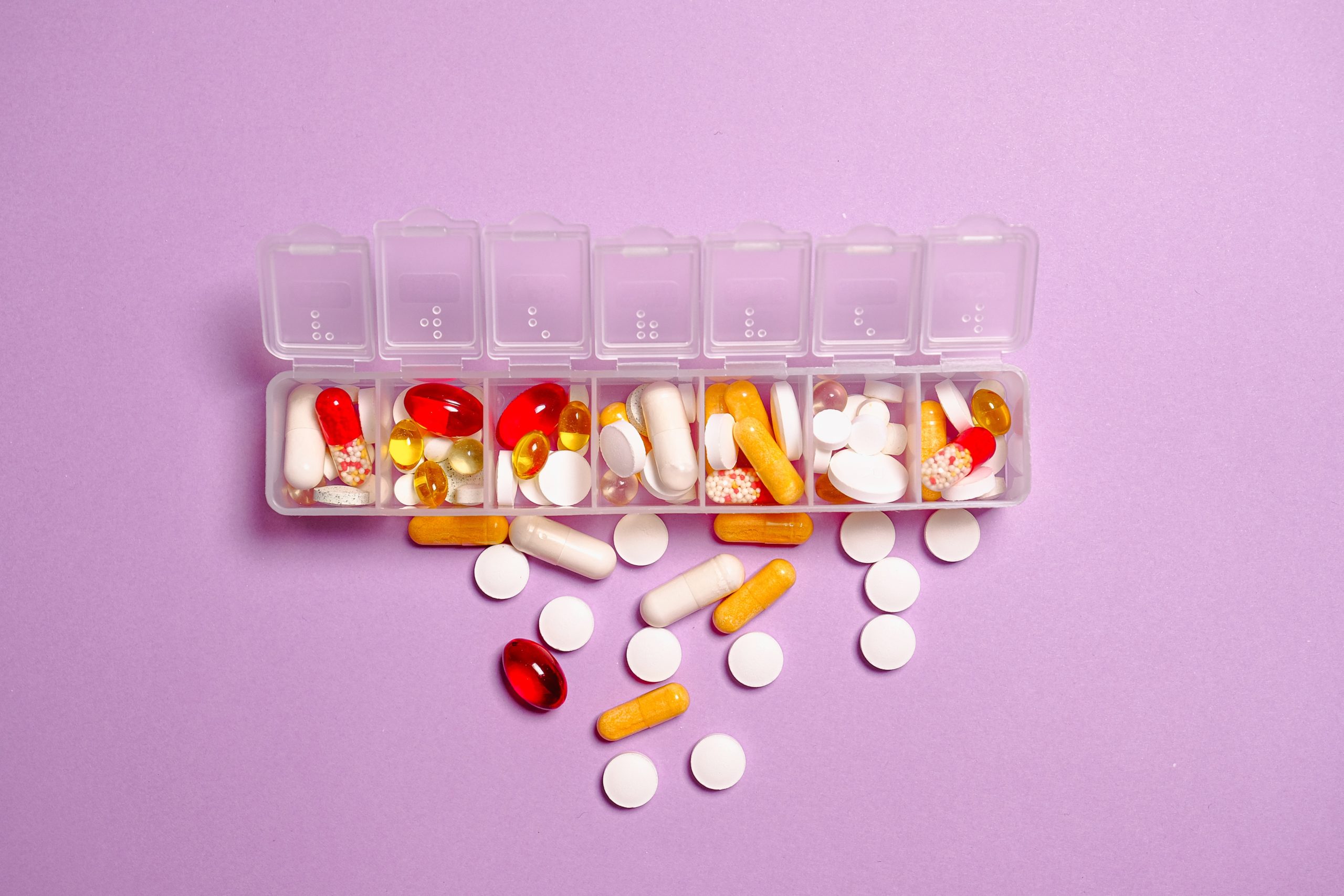Many medications can be affected or compromised by food or herbal items. An open dialogue about medications and potential interactions is encouraged for patients and their health care provider and/or pharmacist. Learn everything you need to know about food and drug interactions.
COCKTAILS AND MEDS DON’T MIX
It’s generally advised that people taking any medications should not mix them with any type of alcohol, but there are specifically some drugs where it’s most important. In particular, alcohol should not be mixed with any type of antihistamines as it will add to drowsiness already caused by the medications. People who drink three or more alcoholic drinks per day should also not take the pain reliever acetaminophen, or brand name Tylenol, as it can cause liver damage, as well as Non-Steroidal Anti-Inflammatory Drugs (NSAIDs) like Advil or Aleve as it can cause stomach bleeding. In addition, alcohol should definitely be avoided when taking any sort of narcotics like codeine or oxycodone because it can increase the chance of side effects like a coma or death. Alcohol should also be avoided when taking statins, or cholesterol lowering medications, as well as bronchodilators, which treat and prevent breathing problems because it can increase side effects like liver damage, nausea and vomiting. People taking antidepressants, antipsychotics or sedatives should also avoid alcohol as it can add to the side effects caused by those medications. Alcohol can prolong the effects of insulin in diabetics causing hypoglycemia. Type 2 diabetics can drink 1-2 alcoholic drinks while on oral diabetic medication, but they should carefully consult with their physician. These are just some of the medications affected by alcohol. In general, patients should always consult about alcohol use with their doctor or pharmacist when they begin taking a medication.
BE CAREFUL WITH FRUITS AND VEGETABLES
Warfarin or Coumadin is a blood thinning medication. Eating too many foods high in Vitamin K such as broccoli, spinach, kale, and brussel sprouts can interfere with clotting factors. A patient should not begin drastically increasing their intake of foods rich in Vitamin K, but rather keep their intake consistent. Grapefruit is a fruit highly identified with interactions with medications. It can increase the absorption of medicines, especially cholesterol-lowing statins. Its effects extend to other medications as well. As opposed to other citrus fruits, grapefruit contains a set of compounds named furanocoumarins, which can alter the effects of many medications. How many medications can it affect? It’s been shown to alter the blood levels of drugs like antihistamines, blood pressure drugs, thyroid replacement drugs, birth control, stomach acid-blocking drugs, and the cough suppressant, Dextromethorphan.
BEWARE OF CHEESE, CHOCOLATE AND CANDY
Who doesn’t like a nice piece of cheese and a taste of rich chocolate or candy? Unfortunately, these foods are rich in the amino acid tyramine which can cause an increase in blood pressure. Monoamine oxidase inhibitors (MAOIs) which treat depression, and drugs used to treat the symptoms of Parkinson’s disease can interfere with the absorption of tyramine. In addition to chocolate and cheese, foods rich in tyramine include smoked meats, hot dogs, some processed lunch meats, fermented soy products and draft beers. The candy, black licorice, which contains an ingredient known as glycyrrhiza, can rob the body of potassium and increase the retention of sodium, which when combined with a medication to treat heart failure, digoxin, can result in the heart not beating properly. Black licorice also interferes with warfarin by breaking down the drug and decreasing the effectiveness of high blood pressure.
HERBAL MEDICATIONS NOT ALWAYS IMMUNE
We know that modern pharmacy stems from the study of plants and herbs, and they continue to be powerful agents for natural healing. However, even though herbal medications claim to be “all natural,” it does not always mean that they are completely safe or immune from potentially dangerous interactions. Herbal supplements can be sold as teas, tablets or capsules and tinctures or solutions. The Food and Drug Administration (FDA), does not regulate herbal medications and apply the same safety standards as it does for traditional medications.
Herbal medicines can interfere with pharmaceutical medications by suppressing the pharmaceutical’s effectiveness, enhancing side effects or interfering with how the drug breaks down in the body. Some of the more notable interactions include CoEnzymeQ10, which is used to help heart damage, breast cancer, gum disease, or muscular dystrophy. Use of CoQ1o may decrease the effectiveness of warfarin. Similarly, cranberry, believed to be effective in improving urinary tract health, can also interfere with warfarin. St. John’s Wort, an herbal medication that many claim to help treat depression, has numerous and potentially dangerous side effects when used with many drugs. These include selective serotonin reuptake inhibitors and tricyclic antidepressants, MAO Inhibitors, triptans for migraine, dextromethorphan, warfarin, birth control pills and certain HIV medications. Ginkgo Biloba has a long history of being used for symptoms of Alzheimer’s, dementia, Parkinson’s disease, and to aid in general memory support, among other uses. Unfortunately, ginkgo can also alter the actions of medicines metabolized through the liver which includes agents such as omeprazole (Prilosec OTC), uvastatin (Lescol), and donepezil (Aricept). Ginkgo should be avoided in patients who take seizure medications, blood thinners or diabetes drugs.
ALWAYS CHECK WITH YOUR DOCTOR
Although these are but few of many food and drug interactions, the message is clear: when beginning a medication, always check with your doctor for what foods and herbal products may have potentially minor or severe interactions. Patients are also advised to contact their doctor immediately if they have an abnormal reaction to a medication. It is recommended that patients keep a record of dietary items or supplements taken to evaluate possible dangerous interactions.
Related articles:
Don’t Take The Benefits Of Pomegranates For Granted!
How Often Should You Be Washing Your Hair?
Energy Snacks For Your Afternoon Slump
Ted Talks: Devoting 2021 To Small Victories And Sun Salutations

